Freelancer
An epic game, with an epic period of development behind it
It takes a brave development studio to take on the legacy of Elite and Frontier - two of the videogames which defined the 8- and 16-bit eras of home computing and which are now viewed through spectacles so rose-tinted that it's extremely difficult for any game in even remotely the same genre to live up to the expectations they have created. Some noble attempts have been made, certainly - X: Beyond The Frontier is one which has a lot of fans, for a start - but in general, the sheer amount of content and the incredible reputation you have to live up to seems to dissuade developers from working on this kind of game.
Unless, of course, you're Chris and Erin Roberts - the men behind the Wing Commander series, who set out to create a sprawling, hugely ambitious free-roaming space trading and combat sim way back in 1997. The development team at Digital Anvil has seen plenty of changes since then, including a change of leadership when Microsoft took charge of the project in 2000, but now Freelancer is finally here - an epic in terms of development time, if nothing else.
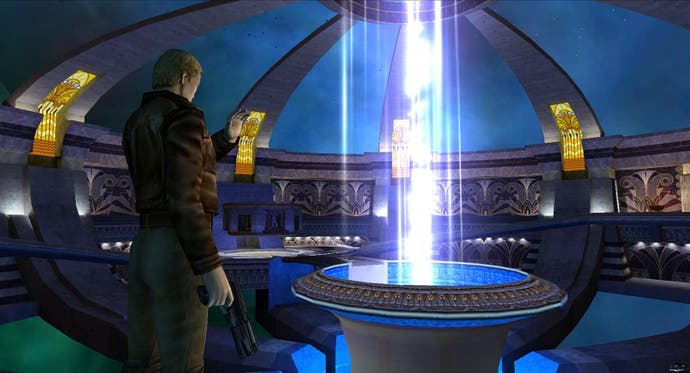
Space Ninjas!
Writing about Freelancer, the first word that springs to mind is "polished", because the game is certainly that. It's refreshing and enjoyable to encounter a PC title with the same kind of production values and attention to detail that goes into the best console games, and Freelancer has been buffed to a shine from start to finish. The intro video to the game is a perfect example, featuring a gravely voiceover which explains the history of the universe you're about to enter while stunningly rendered (and very Babylon 5-esque) footage of space battles runs in the background. Then it's off into in-game cut scenes which deal with slightly more current affairs, including the destruction of a space station by agents unknown, and introduce your initially very hard to like character, Trent, who is left with nothing but the clothes on his back following the destruction of the station.
No flying around for you yet, though - first you have to acquire a ship. You begin the game on Planet Manhattan, in the New York system - and like most stations and planets in the game, it has a grand total of five locations, namely the launch pad, the bar, the equipment dealer, the commodities dealer and the spaceship dealer. You access each individual location by clicking a tab at the top of the screen, and can then speak to people there by clicking on them - an icon appears over each one to give you some idea of the sort of conversation they may have on offer.
A little bit of poking around will locate you a ship and an early mission to fly, which effectively counts as a tutorial by introducing you to a variety of aspects of the Freelancer universe - such as some of the different factions, the trade lanes which speed up interplanetary travel, and the basics of combat. From here on, you'll alternate playing the "freeform" game, in which you can take on whatever missions you like at the bars on various planets and stations, or act as a commodity trader, or even become a pirate or asteroid miner, whilst also tackling "plot" missions which move the story of the game forwards and gradually open up more and more of the universe for you to explore.
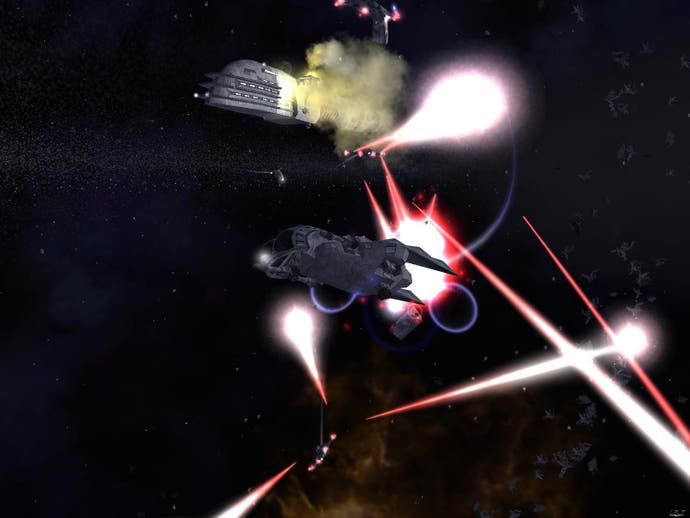
Grand Theft Spacecraft
If that all sounds a little familiar, that's probably because you've been playing Grand Theft Auto recently - and indeed, comparisons between Freelancer and GTA, however unlikely that may sound, are actually quite solid. Digital Anvil has spent ages creating a living, breathing universe for you to explore, in which plenty of stuff happens without your intervention (you'll often see pirates attacking convoys as you fly past, or the military laying into a group of rogue ships - and of course you can pile in and help either side as you see fit) and in which you have quite a bit of freedom to do as you like and to play the game in whatever way you see fit. The sensation of a living universe is interesting on a superficial level - such as listening in to radio transmissions between space stations and nearby ships - but it's also important to the game itself. You'll gradually develop friends and enemies among the factions, for example, which can restrict what parts of the universe it's safe to travel to, or who will give you jobs and information.
In other ways, however, Freelancer is far more rigidly linear that Grand Theft Auto. At preset points in the game - determined by your character's growth in terms of net worth - you'll be contacted by someone who drags you into a plot mission, and you don't really have a choice about whether you take part in this or not. Although the plot missions are quite entertaining (especially in comparison to normal missions picked up at bars, which generally boil down to "go here and kill everyone you see"), once you commence one you're locked into it for quite a while, which can be annoying as it often feels like you're being dragged by the nose through areas which you'd far prefer to hang around and do other things in.
To make matters worse, if you fail an objective in a plot mission, it's game over - you don't get to retry the mission without loading a save game (although thankfully Freelancer does save the game for you at sensible times). All of this is annoying when compared to GTA; for someone expecting the pure freeform gameplay of Elite, however, it'll be infuriating. That said, taken on its own merits rather than compared to other games, the plot structure of Freelancer has a lot going for it; it's interesting, doesn't have too many long cut scenes, presents you with some really spectacular space battles and, pleasantly, has excellent voice acting all round.
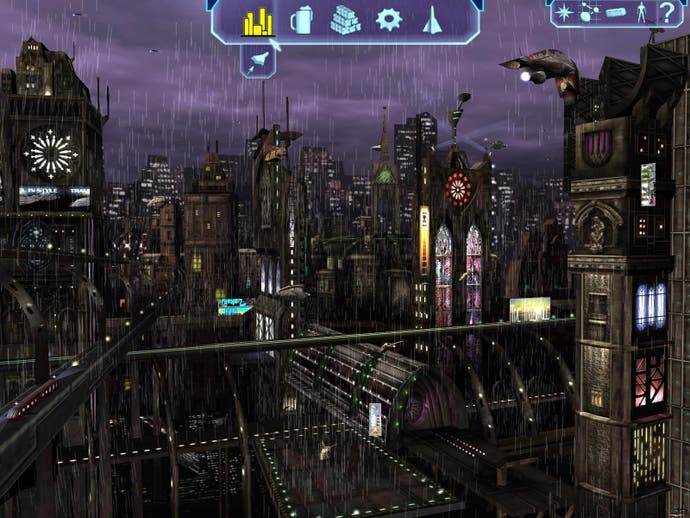
Fly me to the Mooooooon
When it comes to the actual flight and combat system in the game, Freelancer takes an unusual approach which pays huge dividends - namely, it eschews the use of the joystick entirely, and is designed from the ground up to be controlled with a keyboard and mouse. We can hear the space flight sim enthusiasts howling from here, but don't worry - although the flight system takes a while to get used to, it's actually very precise and a lot of fun, feeling a little bit like a first-person shooter but with full rotation on every axis. In fact, the default key setup uses the standard FPS keys - namely WSAD for throttle up, throttle down, slide left and slide right - with the mouse for looking about and shooting. Your weapons follow the mouse cursor exactly and right clicking fires bound weapons, while other keys unleash missiles, torpedoes and countermeasures, and yet more keys refresh your shield batteries or release canisters of nanobots to repair your ship hull.
It only takes a very short while to get used to the controls of the game, and once you do, they feel very precise. The physics used are distinctly in the realms of science fiction, so you won't have any trouble getting your head around the control of your ship, and there are plenty of handy automated commands so that you don't have to manually handle tedious things like keeping on course throughout long journeys or docking with space stations - very handy if you're returning from a mission to a planetary docking ring twenty clicks away and dying for a potty break...
As you progress through the game, you'll gradually upgrade to new ships and attach better weapons to your hardpoints - which is initially a lot of fun, as your hard-earned credits go into new and more evil beam weapons and missiles to knock your targets out of the sky. However, this gradually begins to feel like a levelling treadmill - not least because the degree to which you can upgrade your ship at any given point is fairly limited, and the enemies you face become harder at almost exactly the same rate as your ship becomes more powerful. Although it can be fun to go back and slap around some of the people who gave you trouble previously, ultimately it's a bit of a shame that later battles in the game don't play out in a particularly different way to early ones, and the tactics which work two hours into the game will work just as well ten hours later.
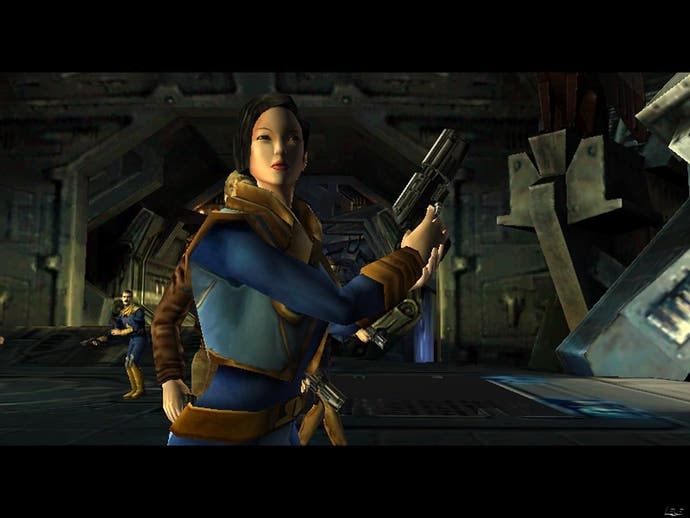
Free as a bird
The parts of the game where you're free to fly around and do as you please are quite interesting, but again there's a question mark over the level of variety offered by the game. On each space station or planet, you'll go through the same ritual - repair your ship, replenish your ammunition, and sell any goodies you collected in battle. Then it's off to the bar to chat to the locals and see if you can find out any useful information - the answer to which is generally no, you can't. Many people in the bars will talk to you and tell you "rumours", which generally turn out to be of little real value to you. The game constructs the speech of NPCs like these from snippets of recorded dialogue, which doesn't work all that well - the library of phrases available to them is very limited, and the conversations you'll have in the bar are almost laughably stilted, not to mention very monotonous. The other option here is looking at the jobs board, where you can find work for a gun for hire such as yourself.
As mentioned previously, this work all generally boils down to the same thing - going to a location in space, usually in an asteroid field or something along those lines, and killing all the bad guys that show up. We'd have liked to see a lot more variation in these missions - a few more convoy escort missions, or what have you, would have spiced this section of the game up nicely. That said, the combat model in the game is certainly enjoyable enough that killing bad guys doesn't really ever get boring, so this isn't too much of a black mark against the game.
The other options open to you are trading and mining. Trading is a relatively simple affair - perhaps a little too simple in fact, since you'll find that prices for goods are static throughout the universe. Freelancer operates no economy simulation, making it extremely simple to profit through trading - but without any element of risk involved, it's quite a tedious business. Mining comes under the same heading, as you can make decent money mining the asteroid fields but again, it's something you need to be very patient to profit from.
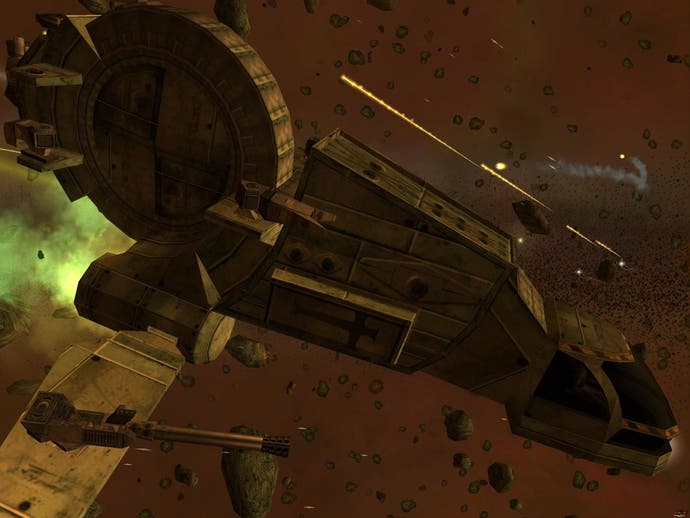
Invading your Personal Space
The multiplayer options offered by Freelancer are intriguing, but we can't help but feel that this is another game you won't particularly want to play on online public servers. You have the ability to create your own server, and in a manner not dissimilar to last summer's RPG title Neverwinter Nights. Characters are stored on the server - giving you a persistent world that you can log into and play with your friends. Not quite massively multiplayer, but fairly bloody big multiplayer nonetheless.
The potential for flying missions and levelling up as a group within a persistent world such as that offered by Freelancer online is immense; however, we suspect that a lot of online servers may opt for the more short-term fun of giving everyone enough cash to buy a top-notch ship as soon as they log in, thus removing the levelling up element of the game. If you have a group of friends to play Freelancer with, it'll be great fun multiplayer - but don't rely on public online servers for the same kind of experience at all.
The Final Frontier
We can't help but feel that Freelancer falls somewhat short of the expectations set by Chris and Erin Roberts when they talked about the epic scale of the project, and it's obvious that many of the original ambitions for the game have fallen by the wayside since it was conceived - mostly, we suspect, for technical reasons. The universe the game has created is certainly interesting and dynamic, but the range of things you can do within it is limited - albeit that, like GTA, it offers the potential for finding new and amusing things to do, such as getting yourself chased by a squadron of bandits and leading them right into the guns of a military battlecruiser...
Despite not quite living up to expectations, however, Freelancer is an enormous amount of fun to play. The game does suffer from a lack of innovation as it progresses, but the basics of the gameplay are solid and the sheer polish of the title - not to mention the interesting plotline - are enough to keep you going for many, many hours. Although somewhat flawed, Freelancer has enough charm and enjoyable gameplay to rank it as one of the best PC games in a long time, and one of the best PC space sims ever. If the online multiplayer element really takes off and is done properly, then add an extra mark on top of this verdict as well.

